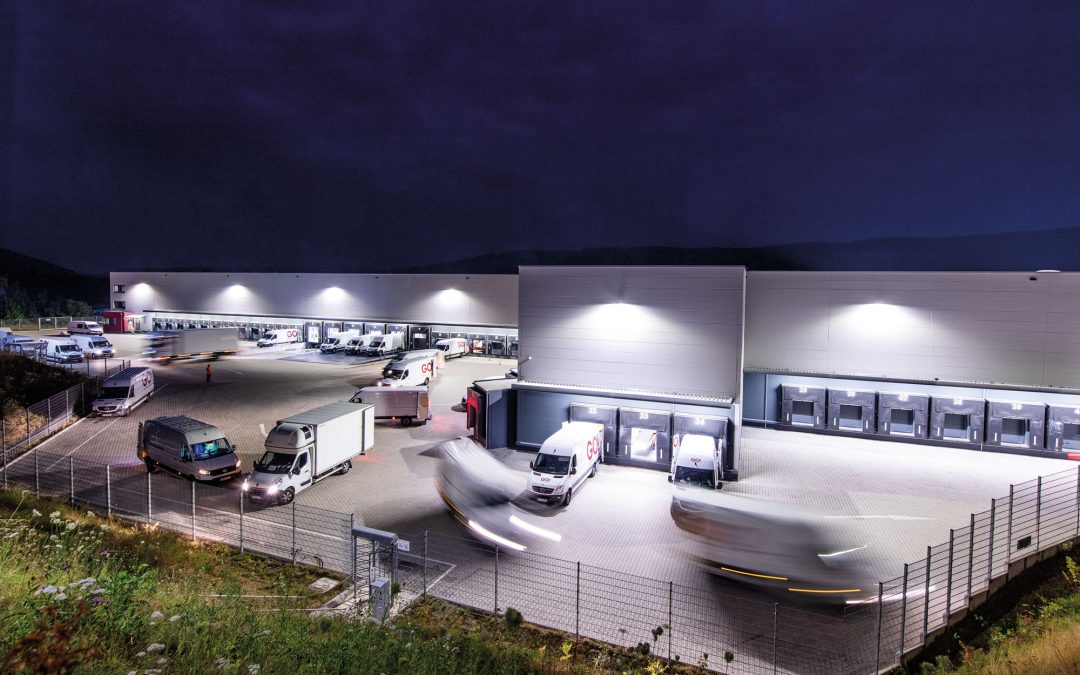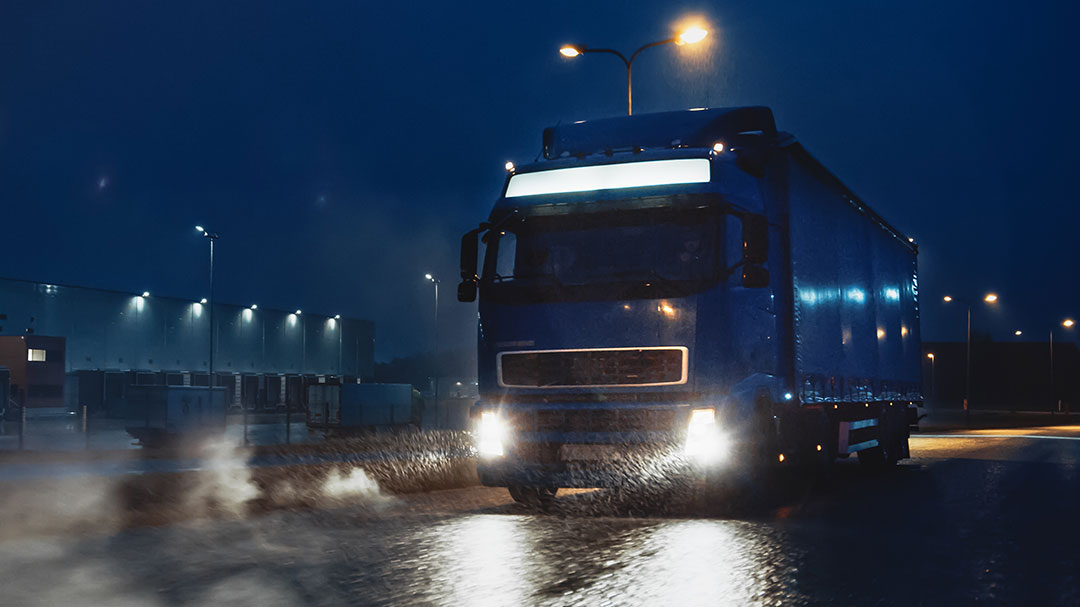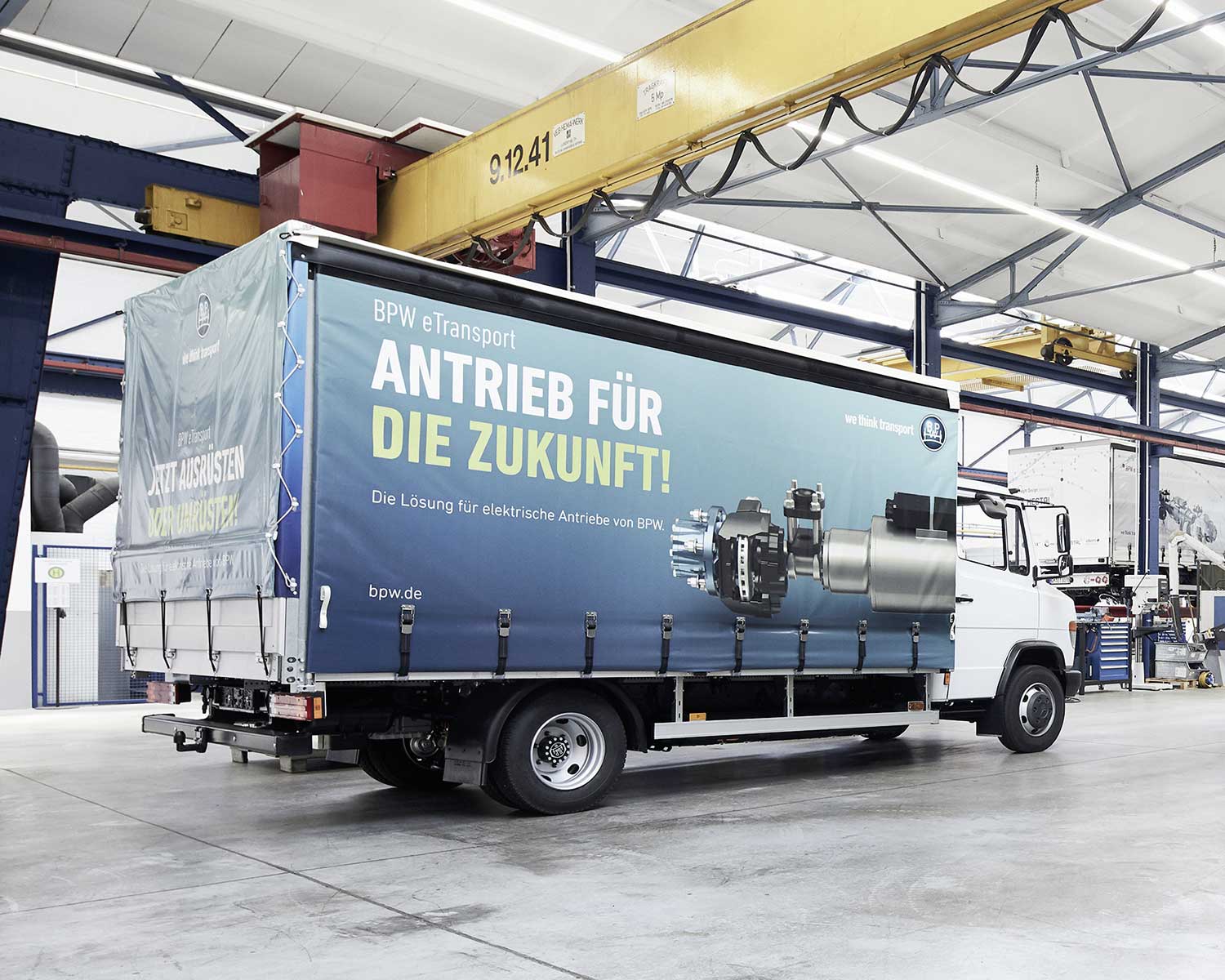Reading time: approx. 8 minutes
Text: Juliane Gringer
Photos: GO! Express & Logistics Deutschland GmbH, Achim Bachhausen – REWE Group, Hoffotografen
Night logistics could be a real problem-solver: with emission-free and low-noise vehicles, night logistics protects the climate and could even spare local residents’ nerves from imminent gridlock in cities. But how much longer do we need to wait for this to become reality?
If goods could be delivered silently and emission-free at night, this could significantly reduce traffic in crowded city centres. During the hours of darkness, trucks could drive along empty roads almost unnoticed, meaning fewer traffic jams and lower emissions during the day. A seemingly perfect solution – but so far, night logistics is only rarely implemented. The biggest drawbacks include strict legislation and the fact that – up until now – no suitable vehicles have been certified in Germany. The German Federal Ministry of Transport and Digital Infrastructure (BMVI) now wants to promote the development of such certifications, as it announced in the ‘Logistics 2030 innovation programme’. The ministry also intends to lobby for federal states and local authorities to launch innovative model projects, too. According to the paper, the business community will be responsible for this, supported by the BMVI. German MP Steffen Bilger, the federal government’s coordinator for freight transport and logistics, plans to meet with representatives from companies and scientific institutions at the end of June 2020.
Pioneering project in the field of night logistics
The REWE Group has already tested night logistics. The food retailer took part in the ‘GeNaLog’ research project (low-noise night logistics), which was carried out by the Dortmund Fraunhofer Institute for Material Flow and Logistics together with other partners between 2014 and 2017. ‘This project proved very successful, thereby demonstrating that night logistics is feasible,’ says Birgit Heitzer, head of Group Logistics at REWE Group. ‘Nevertheless, there is still a long way to go in practice – after all, night-time delivery has not yet been implemented since there is no legal certainty. There is an urgent need for generic regulations here.’ Furthermore, Heitzer considers it essential that the federal government promotes investment in vehicles that will be certified in future.
»Companies that want to implement night logistics should not have to clarify the individual steps with each local authority; we need generic regulations instead.«
Birgit Heitzer, head of Group Logistics at REWE Group
City centres threatened by gridlock
Michael Reink, head of Location and Transport Policy at Handelsverband Deutschland (HDE), is also calling for standardised guidelines on the basis of which local authorities can issue permits: ‘Those responsible need a clear legal basis. And this is urgent since there is growing pressure on the roads.’ ‘Impending gridlock is the true problem,’ says Reink. ‘We really have to take action here, otherwise we are facing traffic chaos in our city centres. Creating a framework for night logistics should therefore have a much higher priority. As an association, we are calling for these measures to be implemented faster in Germany. We’ve asked our companies whether they consider this to be an alternative, and their response was positive – even though they may face higher costs.’
Certification urgently required
In his opinion, in order to implement night logistics, it is first necessary ‘to build up a sufficient fleet of quiet, electrically powered vehicles more quickly. Our dealers are testing the few trucks that are currently available on the market. We would like to see more research into hydrogen technology here.’ He goes on, ‘The vehicles must be certified – reliably – so that users can be certain that they are allowed to use them for driving at night.’ There is such a The Piek certificate in the Netherlands: in 1998, the government there set standards for noise emissions during loading and unloading in retail and trade businesses. This resulted in a certification system for vehicles and equipment suitable for night-time deliveries.
To meet the standard, each vehicle is measured acoustically: from outside the most affected residential window, a value below 45 dB(A) must be maintained at night – which is below the noise level of a television set to a room volume of 60 db (A). One-off brief noise peaks may not exceed the night-time noise-pollution guide values by more than 20 dB(A). This does not cause noise disturbance to local residents and is considered suitable for delivery outside business hours. ‘However, noise limits in the Netherlands are slightly different from those in Germany, and the measuring point there is in the home and not outside it, as in this country. Therefore, the certificate cannot be transferred directly,’ says Reink, regretfully. ‘But we would need this or a similar certificate here.’ The BMVI points out that, due to our federal constitution, findings from the Netherlands can only be applied in Germany to a very limited extent.
Using quiet rollers
Huge increase in volume
»We consider night logistics to be a clear problem-solver for the impending traffic gridlock.«
Michael Reink, head of Location and Transport Policy at Handelsverband Deutschland (HDE)
A lack of willingness to change
Ulrich Nolte, managing director of GO! Express & Logistics (Deutschland) GmbH would also like to have the option of delivering during other time windows. Together with commercial recipients in the city, delivery times in the early hours of the morning or even late in the evening would have to be made possible, he explains: ‘This would not automatically lead to less traffic, but it would spread it out and thus reduce congestion and emissions.’ But there is a major challenge here: ‘Recipients must be prepared to receive the shipments at an unfamiliar time,’ says Nolte on the BPW Bergische Achsen Wiehler Forum 2019. ‘This has been difficult thus far for commercial recipients, since nobody is on site that early. New concepts are welcome – but this would also mean changing existing logistics practices.’
»We could deliver earlier, but recipients must be prepared to receive the shipments at an unfamiliar time.«
Ulrich Nolte, managing director of GO! Express & Logistics (Deutschland) GmbH
Organising package acceptance collectively
It goes without saying that the customer is not solely responsible for resolving the issue, emphasises Nolte. Local authorities also need to create the appropriate framework conditions. ‘As a nationwide organisation, we are of course in contact with them in many places and are also talking to our customers about alternative concepts.’ Nolte is certain, ‘There is no single solution where one size fits all. Individual cities are also showing different levels of interest. But you can feel that there’s some movement in this area.’ After all, we can all see how crowded the streets are already. ‘Urban space is scarce. Every business enterprise that has scarce resources asks itself how it can utilise them better and more sensibly,’ says the managing director in summary. ‘Night logistics would be an effective tool in this case.’
Investment can pay off several times over
In terms of costs, Michael Reink from the HDE sees potential advantages: ‘Logistics infrastructure and the corresponding vehicle fleet are usually associated with high outlay – but if you can extend their use to 24 hours, this could have a positive effect.’ If he had his way, night logistics would be implemented quickly: ‘Our cities are already very crowded. While we can still get from A to B quite easily now, it is precisely this situation that should be drawn on to implement the necessary steps now,’ he demands. And it’s also a case of the quicker, the better. ‘To my mind, implementing night logistics in 2020 is not pie-in-the-sky thinking; I consider this to be a realistic target.’










